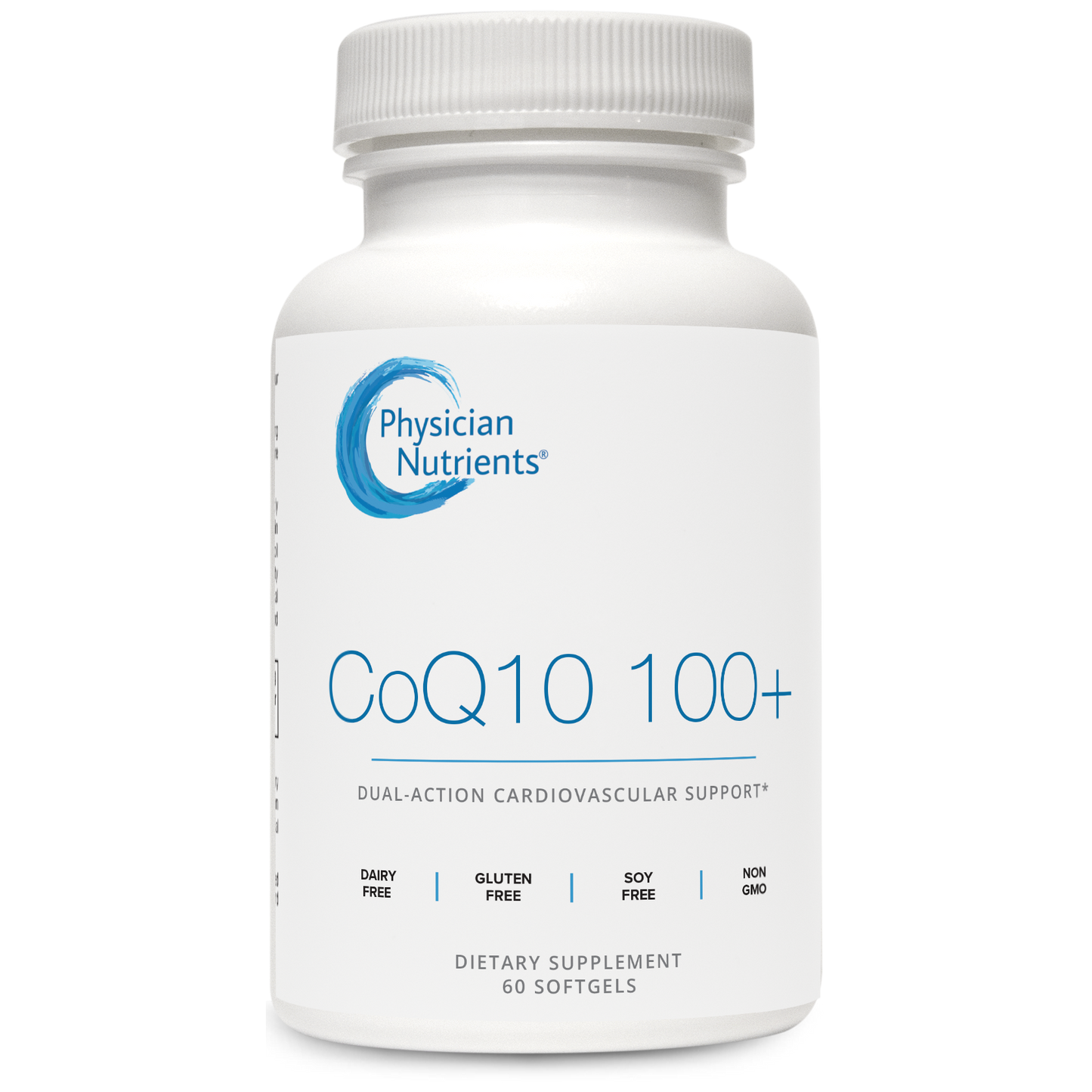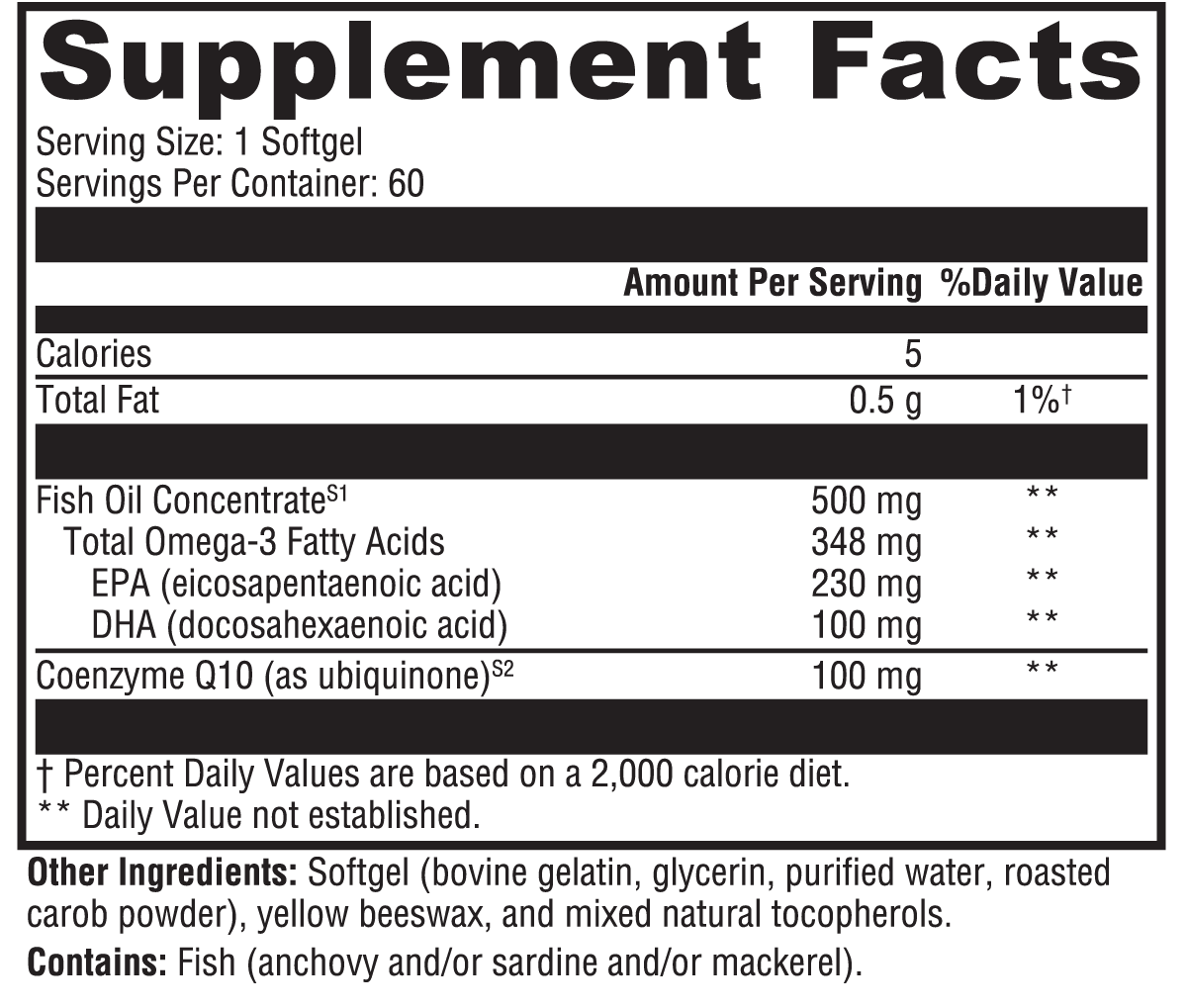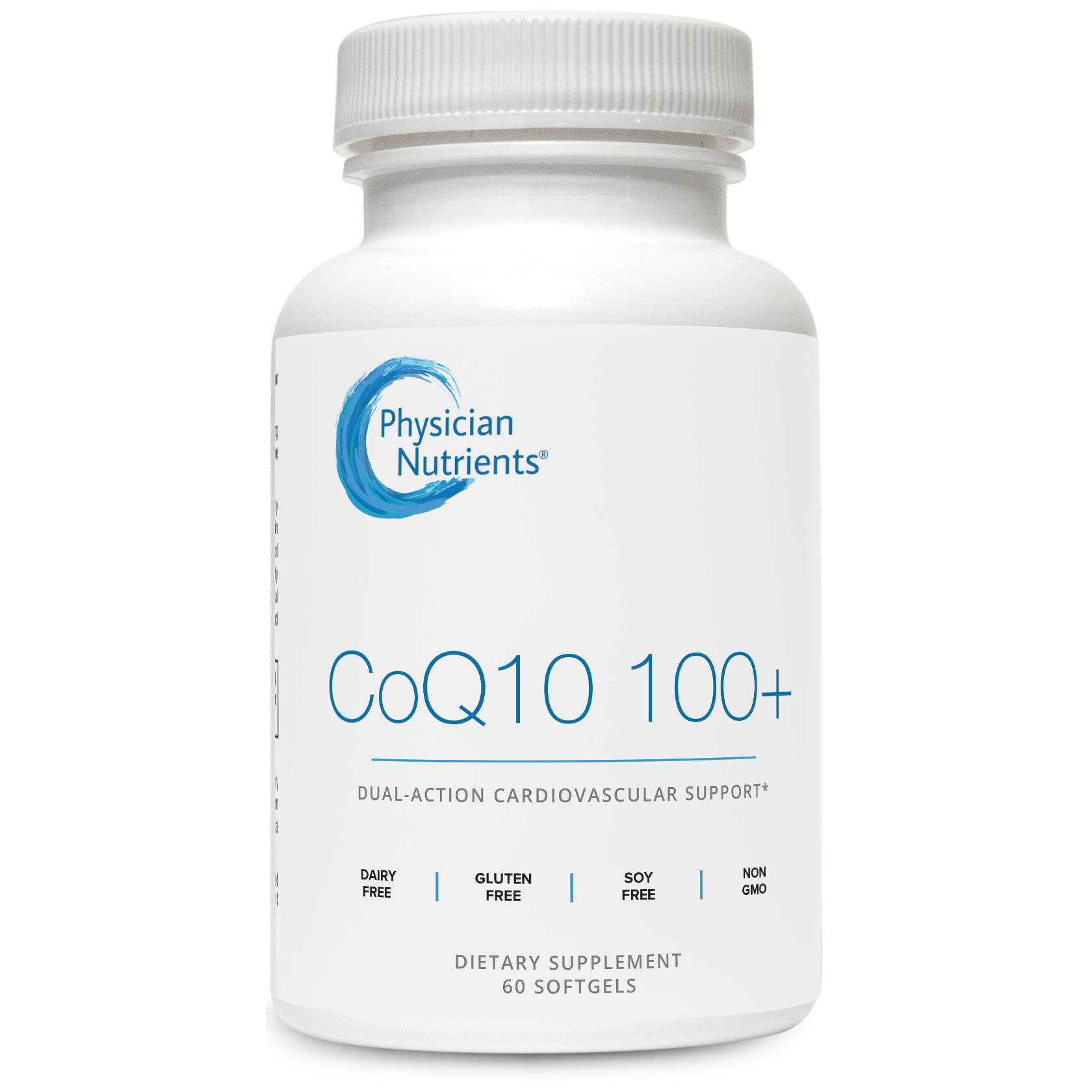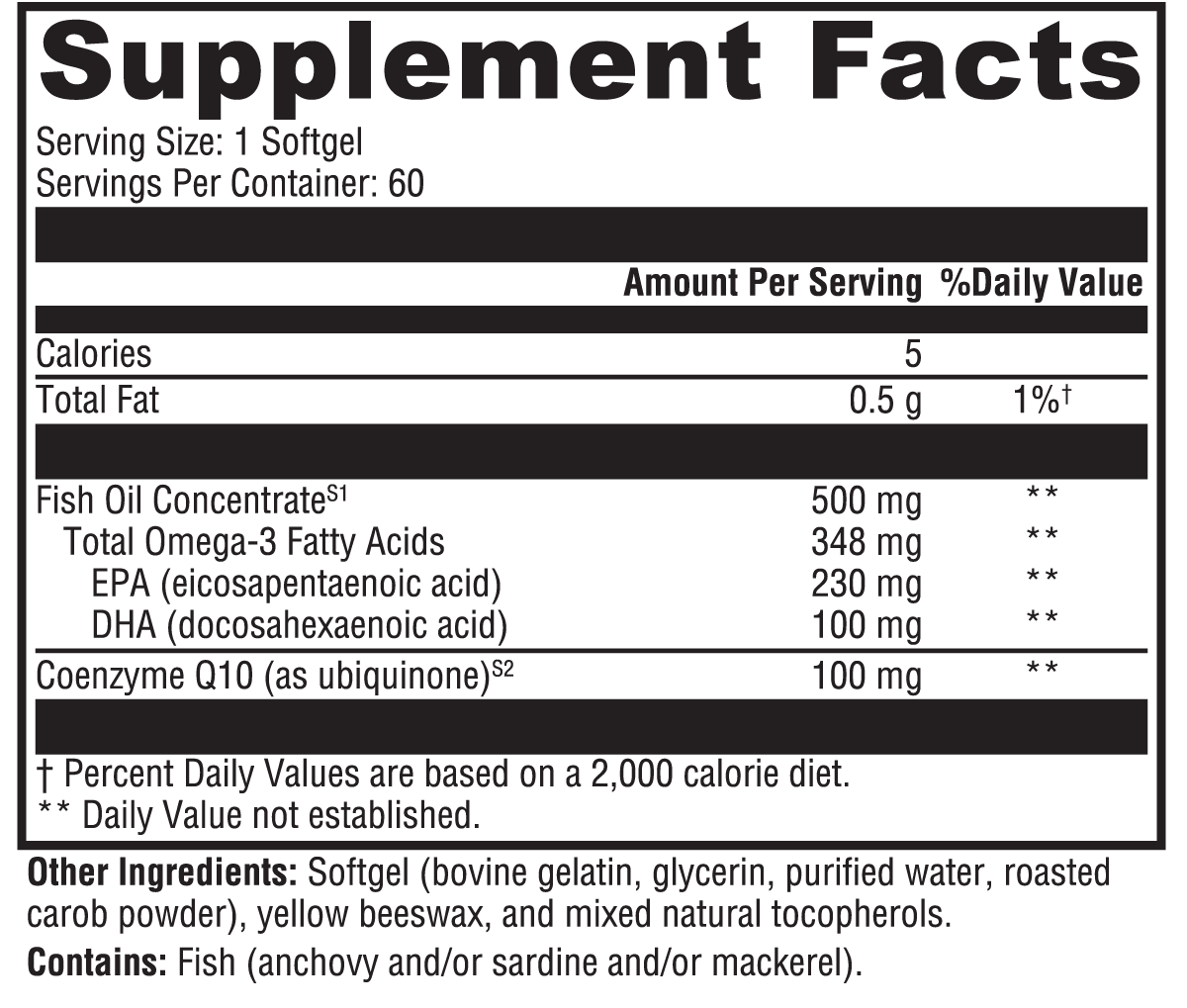Physician Nutrients
CoQ10-100+
CoQ10-100+
Couldn't load pickup availability
CoQ10 100+ formulations provide dual-action cardiovascular support with patented ingredients selected for their individual roles in promoting heart health. MaxSimil® is a highly absorbable monoglyceride fish oil. Kaneka Q10®, a naturally pure form of bioidentical CoQ10, is well-researched for boosting energy production in the heart and protecting the cardiovascular system from oxidative stress.*
*These statements have not been evaluated by the Food and Drug Administration. These products are not intended to diagnose, treat, cure, or prevent any disease.
All Physician Nutrients Formulas Meet or Exceed cGMP Quality Standards
Details
Directions
Take one softgel twice per day, or as directed by your healthcare practitioner.
Consult your healthcare practitioner prior to use. Individuals taking medication should discuss potential interactions with their healthcare practitioner. Do not use if tamper seal is damaged.
Does Not Contain
Wheat, gluten, corn, yeast, soy protein, dairy products, shellfish, peanuts, tree nuts, egg, ingredients derived from genetically modified organisms (GMOs), artificial colors, artificial sweeteners, or artificial preservatives.
Support Science
CoQ10 100+ combines micro-emulsified coenzyme Q10 (CoQ10) with enzymatically enhanced MaxSimil® fish oil to deliver a highly absorbable formulation designed to promote optimal cardiovascular health.*
Kaneka CoQ10® (Ubiquinone)
CoQ10 is a fat-soluble compound utilized on a cellular level to generate energy in the form of adenosine triphosphate (ATP) and protecttissues from the burden of oxidative stress, particularly on the heart. CoQ10 is found in the body primarily in its interchangeable ubiquinoneand ubiquinol forms.*
In general, CoQ10 supports mitochondrial energy production, antioxidant activity, cell membrane stabilization, gene expression and apoptosis, and neurological and cardiovascular health.[1,2] Levels of CoQ10 in the body can be affected by a number of factors; dietary contribution is minimal, and serum levels tend to decline with age or can be reduced due to drug-induced depletion.*[3-5]
Synthesis of CoQ10 in the body is regulated by the enzyme HMG-CoA reductase. A variety of factors can inhibit HMG-CoA reductase and hinder CoQ10 production and availability resulting in a potential increase in oxidative stress and a decrease in energy generation. In the event of reduced production or drug-induced depletion, supplementation with CoQ10 is recommended to help maintain normal levels in the body.*[6,7]
The contribution of CoQ 10 supplementation to cardiovascular health has been supported in human research studies.[2,6,8-10] A randomized, double-blind, placebo-controlled study utilizing Kaneka CoQ10 ubiquinone was conducted in a select group of 49 patients. Researchers observed that supplementation with 100 mg/day successfully restored plasma levels and significantly increased total CoQ10 levels by 127%.*[11]
In the randomized, double-blind, placebo-controlled Q-SYMBIO study, 420 patients were assigned to parallel groups to receive CoQ10 (100mg three times per day) or placebo. Within three months, researchers observed in the CoQ10-supplemented patients a reduction in N-terminalpro-B-type natriuretic peptide (NT-proBNP), an important marker of heart health. After two years, patients who were supplemented with CoQ10 had significant cardiovascular improvement overall compared to placebo.*[12]
In addition to the studies above that explored restoring drug-induced plasma CoQ10 production, research into restoring plasma levels thatnaturally decline with aging has also been conducted. In a study of older adults (N = 24) supplemented with 300 mg/day of CoQ10 for seven days prior to cardiac surgery, the CoQ10 content of atrial tissue was significantly increased in those taking the supplement, especially in patients older than 70 years.*[13]
MaxSimil® Fish Oil Concentrate
The two most well-researched omega-3 fatty acids are the biologically activated oils eicosapentaenoic acid (EPA) and docosahexaenoicv acid (DHA). EPA plays a role in supporting healthy cardiac and circulatory systems while DHA is an essential structural component of the central nervous system. In addition to other physiological effects, research has established that omega-3 fatty acids antagonize arachidonic acid-induced eicosanoid formation. They also help generate resolvins and protectins (EPA and DHA metabolites naturally produced in vivo through enzymatic conversion of EPA and DHA) to aid the body’s “clean-up” response to the arachidonic acid cascade, and they promote cardiovascular health.*[14-21]
CoQ10 100+ features MaxSimil, a novel monoglyceride concentrated fish oil developed using a unique delivery system that enhances absorption of lipid-based and lipid-soluble nutraceutical and food ingredients. Its patented lipid absorption enhancement technology (PLATform) is a unique vehicle by which to deliver EPA and DHA. Due to the fact that monoglyceride oils are intrinsically emulsifiers and are, by nature, in a readily absorbable form, they can bypass the body’s normal fat digestion process. Studies conducted by the manufacturer of MaxSimil provide promising results that show MaxSimil oil may be better absorbed than other fish oils. Rather than supplying a single molecule or metabolite, which would mirror the pharmaceutical model, MaxSimil provides all the benefits of EPA and DHA as well as the expected and desirable benefits of their metabolites. The fish oil is also non-GMO, certified sustainable from Scandinavia, and antibiotic-free.*[22-25]
An unpublished phase 1, double-blind, randomized, crossover, pharmacokinetic study was performed in healthy adults (n = 20) aged between 19 and 71 years who were administered 6 g (containing 1800 mg EPA and 1200 mg DHA) per day of ethyl ester (EE) fish oil or MaxSimil. Parameters studied were plasma EPA and DHA concentration (as percent of total fatty acids), Cmax, and AUC. Compared to EE EPA+DHA, the results indicated that at peak concentration, MaxSimil EPA and DHA forms were three times higher, they reached maximum concentration faster, and maintained their plasma levels longer demonstrating enhanced clinical bioavailability.[25] While there is no conclusive published evidence at this time, the results from studies conducted by the makers of MaxSimil provide a promising indication of enhanced absorption rates, and additional peer-reviewed research is warranted.*
References
1. Morris G, Anderson G, Berk M, et al. Coenzyme Q10 depletion in medical and neuropsychiatric disorders: potential repercussions and therapeutic implications. Mol Neurobiol. 2013 Dec;48(3):883-903. [PMID: 23761046]
2. Higdon J. CoQ10. Linus Pauling Institute. https://lpi.oregonstate.edu/mic/dietary-factors/coenzyme-Q10 February 2003. Updated April 2018. Accessed September 5, 2018.
3. Pelton R, LaValle JB, Hawkins EB, et al. Drug-Induced Nutrient Depletion Handbook. 2nd ed. Hudson, OH: LexiComp, Inc.; 2001.
4. Berthold HK, Naini A, Di Mauro S, et al. Effect of ezetimibe and/or simvastatin on coenzyme Q10 levels in plasma: a randomised trial. Drug Saf. 2006;29(8):703-12. [PMID: 16872244]
5. Rundek T, Naini A, Sacco R, et al. Atorvastatin decreases the coenzyme Q10 level in the blood of patients at risk for cardiovascular disease and stroke. Arch Neurol. 2004 Jun;61(6):889-92. [PMID: 15210526]
6. Langsjoen PH, Langsjoen AM. The clinical use of HMG CoA-reductase inhibitors and the associated depletion of coenzyme Q10. A review of animal and human publications. Biofactors. 2003;18(1-4):101-11. [PMID:
14695925]
7. Crane FL. Biochemical functions of coenzyme Q10. J Am Coll Nutr. 2001 Dec;20(6):591-8. Review. [PMID: 11771674]
8. Littarru GP, Tiano L. Clinical aspects of coenzyme Q10: an update. Nutrition. 2010 Mar;26(3):250-4. [PMID: 19932599]
9. Munkholm H, Hansen HH, Rasmussen K. Coenzyme Q10 treatment in serious heart failure. Biofactors. 1999;9(2-4):285-9. [PMID: 10416042]
10. Fotino AD, Thompson-Paul AM, Bazzano LA. Effect of coenzyme Q10 supplementation on heart failure: a meta-analysis. Am J Clin Nutr. 2013 Feb;97(2):268-75. [PMID: 23221577]
11. Mabuchi H, Nohara A, Kobayashi J, et al. Effects of CoQ10 supplementation on plasma lipoprotein lipid, CoQ10 and liver and muscle enzyme levels in hypercholesterolemic patients treated with atorvastatin: a randomized
double-blind study. Atherosclerosis. 2007 Dec;195(2):e182-89. [PMID: 17681347]
12. Mortensen SA, Rosenfeldt F, Kumar A, et al. The effect of coenzyme Q10 on morbidity and mortality in chronic heart failure: results from Q-SYMBIO: a randomized double-blind trial. JACC Heart Fail. 2014 Dec;2(6):641-9.
[PMID: 25282031]
13. Rosenfeldt FL, Pepe S, Linnane A, et al. The effects of ageing on the response to cardiac surgery: protective strategies for the ageing myocardium. Biogerontology. 2002;3(1-2):37-40. [PMID: 12014839]
14. Kim YJ, Kim HJ, No JK, et al. Anti-inflammatory action of dietary fish oil and calorie restriction. Life Sci. 2006 Apr 18;78(21):2523-32. [PMID: 16438990]
15. Maroon JC, Bost JW. Omega-3 fatty acids (fish oil) as an anti-inflammatory: an alternative to nonsteroidal anti-inflammatory drugs for discogenic pain. Surg Neurol. 2006 Apr;65(4):326-31. [PMID: 16531187]
16. Weylandt KH, Chiu CY, Gomolka B, et al. Omega-3 fatty acids and their lipid mediators: towards an understanding of resolvin and protectin formation. Prostaglandins Other Lipid Mediat. 2012 Mar;97(3-4):73-82. [PMID:
22326554]
17. Kremmyda LS, Tvrzicka E, Stankova B, et al. Fatty acids as biocompounds: their role in human metabolism, health and disease: a review. part 2: fatty acid physiological roles and applications in human health and
disease. Biomed Pap Med Fac Univ Palacky Olomouc Czech Repub. 2011 Sep;155(3):195-218. [PMID: 22286806]
18. Weitz D, Weintraub H, Fisher E, et al. Fish oil for the treatment of cardiovascular disease. Cardiol Rev. 2010 Sep-Oct;18(5):258-63. [PMID: 20699674]
19. Psota TL, Gebauer SK, Kris-Etherton P. Dietary omega-3 fatty acid intake and cardiovascular risk. Am J Cardiol. 2006 Aug 21;98(4A):3i-18i. [PMID: 16919512]
20. Sasaki J, Yokoyama M, Matsuzaki M, et al. Relationship between coronary artery disease and non-HDL-C, and effect of highly purified EPA on the risk of coronary artery disease in hypercholesterolemic patients treated
with statins: sub-analysis of the Japan EPA Lipid Intervention Study (JELIS). J Atheroscler Thromb. 2012;19(2):194-204. [PMID: 22186099]
21. Zhang J, Wang C, Li L, et al. Inclusion of Atlantic salmon in the Chinese diet reduces cardiovascular disease risk markers in dyslipidemic adult men. Nutr Res. 2010 Jul;30(7):447-54. [PMID: 20797476]
22. Marik PE, Varon J. Omega-3 dietary supplements and the risk of cardiovascular events: a systematic review. Clin Cardiol. 2009 Jul;32(7):365-72. [PMID: 19609891]
23. Unpublished, internal data. Ingenutra.
24. Fortin S, inventor; Centre de Recherche sur les Biotechnologies Marines, assignee. Compositions comprising polyunsaturated fatty acid monoglycerides or derivatives thereof and uses thereof. US patent 8,198,324. June
12, 2012.
25. MaxSimil Patented Lipid Absorption Technology Clinical Study Report: MaxSimil® 3020 Omega-3. Sherbrooke (Québec), Canada: Ingenutra; 2015. [Unpublished, internal data]
Share




